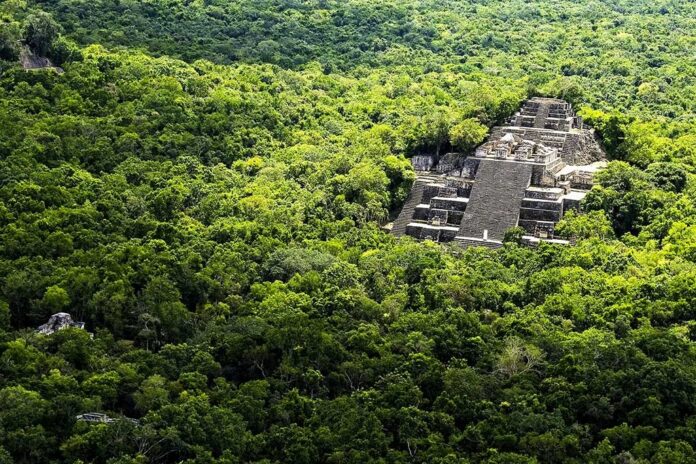What does Calakmul mean, the ancient Mayan city in Campeche?
Buried in the jungle, this settlement was the most important city of the Classic Maya period.
Although the pyramids are everywhere in Campeche, there is a site that surpasses the rest for its conservation and size. We are talking about the archaeological zone of Calakmul which is located within the second largest biosphere in the American Continent, the Calakmul Biosphere Reserve.

Among the countless beauties of the state, the star attraction is the ancient Mayan city of Calakmul, once the most powerful during the classic period of the Maya civilization, now an immense archaeological site buried deep in the jungle.
Calakmul means in Mayan “Two Adjacent Mounds” (Ca Two, Lak adjacent, Mul artificial mound or pyramid), a name that refers to the two large structures that dominate the Campeche jungle.
The archaeological zone was discovered at the beginning of the 30s of the last century, but it is until the 80s that investigations allow us to discover the essence of this city as one of the most important of the Classic Maya period.

The most recent investigations have concluded that Calakmul is the most important city of the Classic Maya and together with Tikal and Palenque they headed the political organization of the highlands. Hieroglyphic studies have accounted for a history of wars between Calakmul and Tikal for almost one century, which speaks of the huge political rivalry of these two cities.
From its discovery in the late 1920s until 1980, Calakmul was lost in time and memory (its presence was officially registered by INAH in 1931). For the next 50 years, gum extractors working all over the Yucatan Peninsula and Southeast Mexico cut the narrative glyphs from the monolithic stelae in the city, to sell it in parts to foreign explorers who were responsible for moving the gum.

To get to Calakmul from the capital of Campeche, it is necessary to take highway 261, heading south, until you reach the city of Escárcega. From there you take the deviation, Escárcega-Chetumal highway (Highway No. 186). At kilometer 95, passing the Conhuás ejido, take the deviation to the south along a paved road and after 60 kilometers you reach the site.
Source: El Heraldo de México







